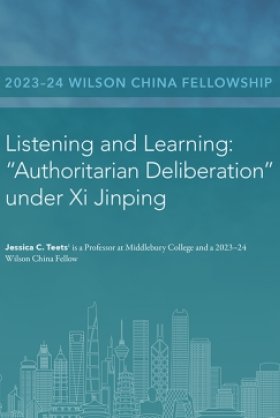Listening and Learning: "Authoritarian Deliberation" under Xi Jinping


During the reform era, scholars and analysts argued that China’s “resilient authoritarianism” derived from “authoritarian deliberation” mechanisms for collecting feedback from citizens. However, in addition to collecting citizen feedback, these authoritarian deliberation mechanisms create mobilization points for advocacy. Authoritarian regimes like China normally isolate policymakers from citizens who advocate for policies. However, during periods of “public comment and notice” where laws are being written and revised, advocates may legitimately share feedback with policymakers. During this “policy window,” civil society organizations (CSOs) typically employ four strategies to influence policy: submitting public comments via the online platform, consulting with government policymakers, disseminating conference reports with recommendations, and publicizing key points through online media. All four of these channels are frequently and simultaneously used. However, they differ in two main ways: effectiveness in influencing policy and level of inclusiveness. Expert testimony in the form of consultations and conference reports seem to be the most effective, while public comments and media publicity are less effective. Conference reports and media publicity are the most inclusive channels, with public comments and consultations as the most exclusive. Xi Jinping’s administration has focused on “responsive government” as a key form of legitimation, but privileges more exclusive channels of feedback, such as consultations and public comments. However, this type of authoritarian deliberation provides less effective citizen feedback on draft policies and creates a fragile form of legitimacy that necessitates a new social contract such as evidenced in the Common Prosperity agenda.
Author

Professor at Middlebury College and Templeton Fellow for the Asia Program at the Foreign Policy Research Institute (FPRI)

Kissinger Institute on China and the United States
The Kissinger Institute works to ensure that China policy serves American long-term interests and is founded in understanding of historical and cultural factors in bilateral relations and in accurate assessment of the aspirations of China’s government and people. Read more






